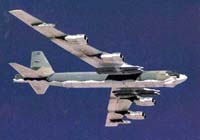USA capable of wiping out Russia’s nuclear capacity in single strike
For the first time in the last 50 years the USA is on the verge of attaining ultimate domination with regard to nuclear weapons. This means that Russia is no longer able to keep up with the United States. If a conflict were to break out, the USA would be able to quickly and with impunity attack Russian territory, and Russia would have no means to mount a response.

This is roughly the message of an article published in the latest edition of the American journal Foreign Affairs. Its authors calculated that in comparison with the USSR, the amount of strategic bombers at Russia’s disposal has fallen by 39%, intercontinental ballistic missiles by 58% and the number of submarines with ballistic missiles by 80%. “However the true scale of the collapse of the Russian arsenal is much greater than can be judged from these figures,” they write. “The strategic nuclear forces now at Russia's disposal are barely fit to be used in battle.”
Russian radar is now incapable of detecting the launch of American missiles from submarines located in some regions of the Pacific Ocean. Russian anti-air defense systems might not manage to intercept B-2 stealth bombers in time, which could easily mean that they are able to inflict a strike with impunity on Russian nuclear forces. If Russian missile forces continue to decrease at the current rate, then in about 10 years only isolated missiles, which the American anti-missile defense is capable of intercepting, will be able to deliver a retaliatory blow. “It will probably soon be possible for the USA to destroy the strategic nuclear potential of Russia and China with a single strike,” says the article.
The article’s authors come to the conclusion that all this may stabilize the worldwide hegemony of the USA and sustain the foreign policy course of the USA, which aims to prevent the appearance of another power centre in the world of equal strength, and to exclude the possibility of weaker nations undermining American positions in key regions around the world, such as the in Persian Gulf.
Russian experts reacted extremely guardedly to the article in the American journal. It is obvious that Russian strategic nuclear forces are experiencing difficult times. Modernization is being carried out, but at a very slow rate. In the 1990s the Russian submarine fleet was almost totally destroyed. And it hardly seems possible to revive it in the coming years, as this would require colossal funds.
But it also obvious that it is completely unjust to talk of the USA’s domination with regard to nuclear weapons. This aim is unattainable within the next decade. “At least until 2015 it is unlikely that Russia’s nuclear containment capacity will noticeably diminish, as there are still some launch systems among the strategic missile forces that Russia can still rely on for a considerable length of time, capable of delivering an effective retaliatory strike,” senior academic at the RAN Institute of World Economics and International Relations Vladimir Dvorkin told Interfax. He has previously headed four research institutes in the Russian Ministry of Defense, devoted to problems of strategic weapons.
However, the main message of the article in the American journal is not that Russian nuclear forces are rapidly falling into decay and do not represent a significant threat to the USA. It is just that in Washington ever more vehement arguments can be heard that Russia is of no particular value to the USA as a political partner.
We should take into account that this journal Foreign Affairs is published by the Foreign Policy Council. As recently as the 6th March it published a report entitled “Russia’s incorrect course”, the main idea of which was that Russia’s opinion is now only important to the USA on certain questions and that the paths of the two countries are significantly diverging. Therefore the article on the forthcoming “nuclear domination” of the United States is no more than an attempt to “scientifically” expound the theory that Russia is of absolutely no use as a partner. Therefore it could be that we will not have to wait long to find out something new about our own country. That prospect is no less gripping…
Comments from experts:
Aleksey Arbatov, Director for the Centre of International Security IMEMO RAN:
At the current time there is no cause for concern. But in the next 10-15 years Russia will have to improve the ground-based component of its nuclear forces – for example, its ground-based radar system and warning system for a missile attack. If it does not do that, then many systems will go out of date, nuclear parity will be lost, and the USA will gain a definite advantage. But Russia has the means to not let that happen – for example, our ‘Topol-2’ complex has no equals in the world, and it needs to be developed in sufficient quantity. In turn, Russian diplomacy must work to ensure that all nuclear powers decrease, not increase the size of their nuclear arsenals.
Leonid Ivashov, General-Colonel, Vice-President of the Academy for Geopolitical Problems:
This article proves that the USA is employing a policy of political intimidation against Russia . This is their way of replying to the announcements of Putin and Ivanov that in Russia there will be a weapon capable of overcoming their air-defense system. In the next 10 years and beyond I hope that the Americans will not make any attack on us, because Russia has something to answer with – even if not in such a large quantity. At the same time this declaration is an expression of discontent with Russia for strengthening relations with China and, in part, with the European Union.
But there is the danger that Russian nuclear forces will shrink to such a level that the American air-defense system will be able to intercept them. And then American winged missiles based at sea will be able to deliver a strike on our infrastructure, our military-industrial complex and on civilian locations. But the USA will only do this if they are sure that Russia will not make a retaliatory strike, at least not such a massive one. And here everything will depend on our leadership, as to whether it will give the order to press the button for a retaliatory strike or not. But even in conditions of our great vulnerability, it is highly likely that for the USA, geopolitical intimidation will be much more important than a military strike.
Oleg Artyukov and Vadim Trukhachev for Pravda.ru
Translated by James Platt
Subscribe to Pravda.Ru Telegram channel, Facebook, RSS!


